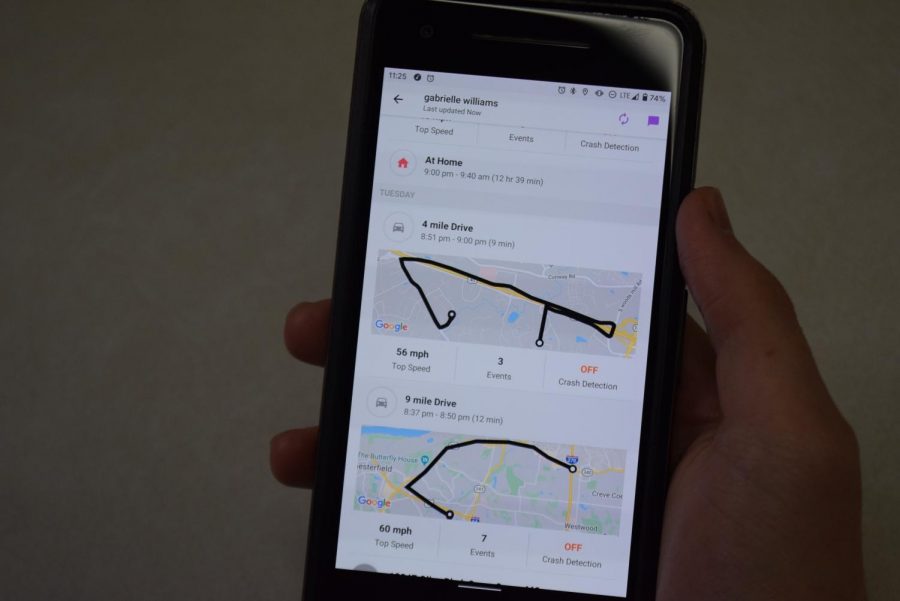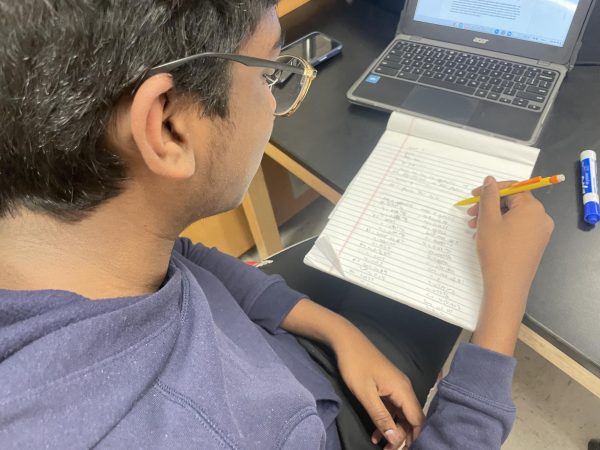Life360: Safety or Stalking?
A student on Life360 looking at a family member’s recent trips. Apps like Life360 can track speed, location, and any unusual stops. Though the app has given parents more information about their child’s whereabouts, some students believe the app is an infringement of privacy. Photo by Alex Maisenhelder.
February 13, 2020
Imagine being under constant surveillance: every step, car ride, and movement monitored by a personal stalker.
For many students, this is their reality. Apps like Life360 allow parents to constantly monitor the location, speed, and driving routes of their family.
To many teenagers, apps like Life360 seem like a privacy breach. In the app store’s reviews, there are tons of negative reviews from teens upset at how the app has changed their lives.
“I have never done anything to lose my parents’ trust and yet they control my life with this app,” an anonymous user said.
Interviewing students, one word came up in almost every interview: trust.
“It’s like why? Why do you need to know where I am?” junior Tiffany Leung said. “Do you not trust me?”
Leung is not alone. Some students believe that being forced into installing the app suggests a lack of trust from parents. If the parents trusted they were good kids with good intentions, why would they feel the need to install a tracking app?
The main argument for Life360 is safety. Psychology teacher Brad Robertson will put his children on the app in a few years.
“I think just to have an eye on where they are in emergency situations [is valuable],” Robertson said. “I think if a program like [Life360] exists and is available, there’s never too much safety.”
Another draw for parents for the app is the ability to make sure their kids are driving responsibly. Speed, road maps of where people have gone, suspicious stops on the road, and even accident detection are just a few other features of Life360.
The idea is that the app will create safer driving habits, due to parents having the ability to see everything their child is doing.
“I mean, sometimes I’ll be like, ‘oh, my mom would not be happy if I was going over the speed limit by five miles per hour,’” junior Makayla Morton said.
For others under the app, like Leung, this aspect of the app is not taken as seriously.
“I don’t think they really care [how I drive], as long as I don’t crash,” said Leung. “I mean, they speed.”
There is a fear of this app being abused by parents. While some parents might use it that way, many don’t. For most parents, this isn’t an app they spend more time on than Candy Crush.
“I can’t see myself or my wife being incredibly overbearing and always following them around in their every move,” Robertson said. “It’s just a nice emergency measure.”
Despite the comfort a parent might get from seeing their child safe at home, a parent will never be completely certain their child is where they think they are. Life360 can be easily duped. Anybody has the ability to spoof their location in multiple ways, from downloading the app on multiple phones to using fake GPS apps on the Android app store. Any motivated person can fool the app
“I feel like it installs a false sense of security in parents,” junior Spencer Kessler said. “It’s very easy to get around Life 360.”
Contrary to the negative Life360 reviews, many of the students I interviewed understood where their parents were coming from.
“I feel like it is an invasion of privacy,” Kessler said. “But to a certain extent, a parent should be allowed to invade their child’s privacy.”












